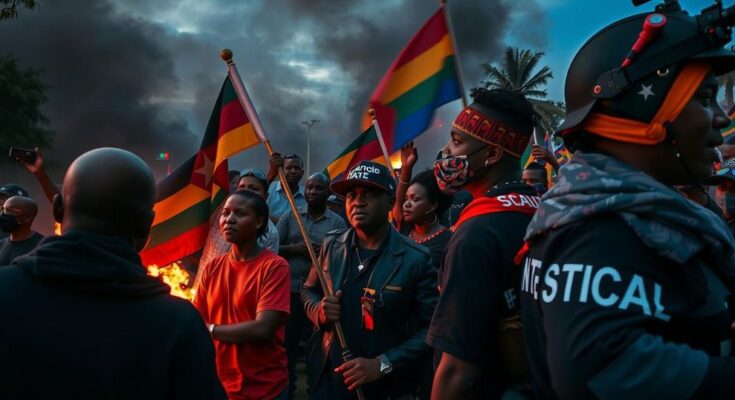Mozambique’s government has imposed social media restrictions amid protests over disputed election results, leading to significant civic unrest. Following the announcement of electoral outcomes on October 24, where Daniel Chapo was declared the winner with 71% of votes, opposition leader Venancio Mondlane has called for nationwide demonstrations starting on Thursday. Reports indicate violence during these protests has resulted in multiple fatalities. Police have warned residents against engaging in acts of ‘sabotage.’
Social media access in Mozambique has been severely restricted following the announcement of a planned nationwide strike instigated by opposition leaders amid disputed electoral results. The internet watchdog NetBlocks reported that as of Thursday, citizens have been unable to use popular social media platforms such as Facebook, WhatsApp, and Instagram since early that day. They confirmed that these restrictions were enforced in light of the opposition’s call for protests across the nation. A temporary internet blackout had already occurred last week following the release of the election results, which led to violent protests being quashed by law enforcement forces. NetBlocks observed that mobile internet connectivity experienced a significant reduction during that time. On October 9, approximately 17 million registered voters participated in the general elections aimed at selecting a new president, parliamentary representatives, and provincial governors. On October 24, the ruling party’s candidate, Daniel Chapo, aged 47, was announced as the winner with 71% of the vote, while his rival, Venancio Mondlane, secured 20%. Following this declaration, Mondlane has advocated for demonstrations disputing the election results, marking Thursday as the commencement of a weeklong strike throughout the country. Recent reports from Human Rights Watch indicate that at least 11 individuals were killed and over 50 injured during the post-election unrest that transpired on October 24 and 25. In anticipation of the Thursday protests, police disseminated messages instructing citizens not to engage in any acts perceived as “sabotage.”
In recent months, Mozambique has faced heightened tensions surrounding its electoral processes, especially following the general elections held on October 9. The electoral commission’s announcement of the results has ignited considerable dissent, leading to calls for protests and strikes by opposition leaders. The country has a history of political unrest linked to disputable election outcomes, and this latest incident underscores the fragility of civil liberties, particularly concerning access to communication platforms. The role of social media in organizing protests and exchanging information has become critical, prompting governmental responses that include internet restrictions to suppress dissenting voices.
In summary, the recent restrictions on social media access in Mozambique are a response to political unrest triggered by contested election results. The strife has already resulted in loss of life and numerous injuries, highlighting significant challenges concerning human rights and freedom of expression in the nation. As opposition leaders continue to rally support for demonstrations, the situation remains tense, necessitating careful monitoring by both local and international observers.
Original Source: www.aa.com.tr




